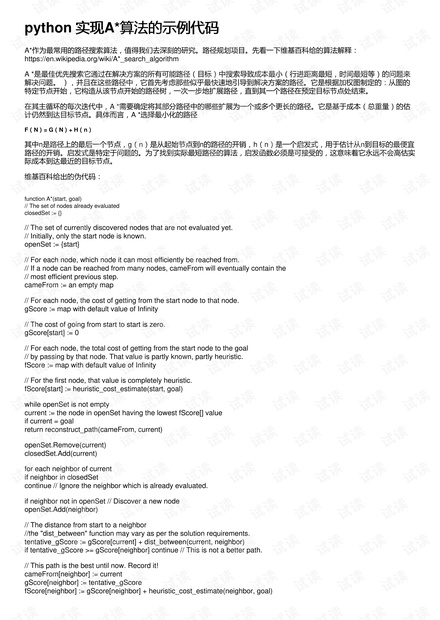没有合适的资源?快使用搜索试试~ 我知道了~
首页python 实现A*算法的示例代码
A*作为最常用的路径搜索算法,值得我们去深刻的研究。路径规划项目。先看一下维基百科给的算法解释:https://en.wikipedia.org/wiki/A*_search_algorithm A *是最佳优先搜索它通过在解决方案的所有可能路径(目标)中搜索导致成本最小(行进距离最短,时间最短等)的问题来解决问题。 ),并且在这些路径中,它首先考虑那些似乎最快速地引导到解决方案的路径。它是根据加权图制定的:从图的特定节点开始,它构造从该节点开始的路径树,一次一步地扩展路径,直到其一个路径在预定目标节点处结束。 在其主循环的每次迭代中,A *需要确定将其部分路径中的哪些扩展为一个或多个更长的路
资源详情
资源评论
资源推荐

python 实现实现A*算法的示例代码算法的示例代码
A*作为最常用的路径搜索算法,值得我们去深刻的研究。路径规划项目。先看一下维基百科给的算法解释:
https://en.wikipedia.org/wiki/A*_search_algorithm
A *是最佳优先搜索它通过在解决方案的所有可能路径(目标)中搜索导致成本最小(行进距离最短,时间最短等)的问题来
解决问题。 ),并且在这些路径中,它首先考虑那些似乎最快速地引导到解决方案的路径。它是根据加权图制定的:从图的
特定节点开始,它构造从该节点开始的路径树,一次一步地扩展路径,直到其一个路径在预定目标节点处结束。
在其主循环的每次迭代中,A *需要确定将其部分路径中的哪些扩展为一个或多个更长的路径。它是基于成本(总重量)的估
计仍然到达目标节点。具体而言,A *选择最小化的路径
F((N))= G((N))+ H((n))
其中n是路径上的最后一个节点,g(n)是从起始节点到n的路径的开销,h(n)是一个启发式,用于估计从n到目标的最便宜
路径的开销。启发式是特定于问题的。为了找到实际最短路径的算法,启发函数必须是可接受的,这意味着它永远不会高估实
际成本到达最近的目标节点。
维基百科给出的伪代码:
function A*(start, goal)
// The set of nodes already evaluated
closedSet := {}
// The set of currently discovered nodes that are not evaluated yet.
// Initially, only the start node is known.
openSet := {start}
// For each node, which node it can most efficiently be reached from.
// If a node can be reached from many nodes, cameFrom will eventually contain the
// most efficient previous step.
cameFrom := an empty map
// For each node, the cost of getting from the start node to that node.
gScore := map with default value of Infinity
// The cost of going from start to start is zero.
gScore[start] := 0
// For each node, the total cost of getting from the start node to the goal
// by passing by that node. That value is partly known, partly heuristic.
fScore := map with default value of Infinity
// For the first node, that value is completely heuristic.
fScore[start] := heuristic_cost_estimate(start, goal)
while openSet is not empty
current := the node in openSet having the lowest fScore[] value
if current = goal
return reconstruct_path(cameFrom, current)
openSet.Remove(current)
closedSet.Add(current)
for each neighbor of current
if neighbor in closedSet
continue // Ignore the neighbor which is already evaluated.
if neighbor not in openSet // Discover a new node
openSet.Add(neighbor)
// The distance from start to a neighbor
//the "dist_between" function may vary as per the solution requirements.
tentative_gScore := gScore[current] + dist_between(current, neighbor)
if tentative_gScore >= gScore[neighbor] continue // This is not a better path.
// This path is the best until now. Record it!
cameFrom[neighbor] := current
gScore[neighbor] := tentative_gScore
fScore[neighbor] := gScore[neighbor] + heuristic_cost_estimate(neighbor, goal)
weixin_38655998
- 粉丝: 11
- 资源: 890
上传资源 快速赚钱
 我的内容管理
收起
我的内容管理
收起
 我的资源
快来上传第一个资源
我的资源
快来上传第一个资源
 我的收益 登录查看自己的收益
我的收益 登录查看自己的收益 我的积分
登录查看自己的积分
我的积分
登录查看自己的积分
 我的C币
登录后查看C币余额
我的C币
登录后查看C币余额
 我的收藏
我的收藏  我的下载
我的下载  下载帮助
下载帮助

会员权益专享
最新资源
- stc12c5a60s2 例程
- Android通过全局变量传递数据
- c++校园超市商品信息管理系统课程设计说明书(含源代码) (2).pdf
- 建筑供配电系统相关课件.pptx
- 企业管理规章制度及管理模式.doc
- vb打开摄像头.doc
- 云计算-可信计算中认证协议改进方案.pdf
- [详细完整版]单片机编程4.ppt
- c语言常用算法.pdf
- c++经典程序代码大全.pdf
- 单片机数字时钟资料.doc
- 11项目管理前沿1.0.pptx
- 基于ssm的“魅力”繁峙宣传网站的设计与实现论文.doc
- 智慧交通综合解决方案.pptx
- 建筑防潮设计-PowerPointPresentati.pptx
- SPC统计过程控制程序.pptx
资源上传下载、课程学习等过程中有任何疑问或建议,欢迎提出宝贵意见哦~我们会及时处理!
点击此处反馈



安全验证
文档复制为VIP权益,开通VIP直接复制
 信息提交成功
信息提交成功
评论0